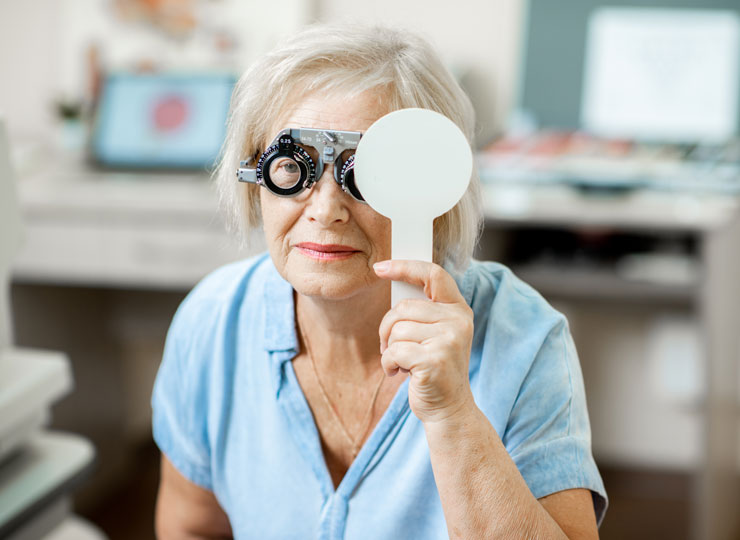
November 22, 2021
Two new studies underscore the importance of good vision for brain health. The studies found that those with impaired vision were at increased risk of Alzheimer’s disease and other forms of dementia. The findings add to a growing body of evidence that good vision, like good hearing, is critical for keeping memory and thinking skills intact as we age.
The first study, in the British Journal of Ophthalmology, looked at 12,364 older adults, aged 55 to 73, living in Britain. Study participants got regular health checks starting in 2006 and 2010 and continuing over the next decade or so, until 2021.
The researchers found that those who had common age-related diseases that impair vision at the start of the study period were at increased risk of developing Alzheimer’s disease or other forms of dementia years later. Those with age-related macular degeneration, which causes loss of vision in the center of the eye and can make it impossible to read, watch TV or drive, were 26 percent more likely to develop Alzheimer’s or another form of dementia than their peers with good vision. Those with cataracts, which blurs vision, were 11 percent more likely to develop dementia. And those with diabetes-related eye disease were 61 percent more likely to develop dementia. Older people with glaucoma, which causes increased pressure within the eye, were at higher risk of developing vascular dementia though not Alzheimer’s disease.
Having a medical condition like high blood pressure, heart disease, depression or stroke along with visual impairment increased the risk of dementia even further.
The second study, published in JAMA Network Open, looked at 1,202 men and women aged 60 to 94 who were living in Baltimore. They got regular vision exams along with tests of memory and thinking skills every one to four years. The researchers followed them, on average, for about seven years.
Compared to those with good vision, those who had vision problems at the start of the study were more likely to show declines in cognitive skills over time. Vision problems were linked to an increased risk of problems with memory language, paying attention, and other thinking skills.
The findings from both studies provide new evidence that vision loss can impair the brain. Scientists speculate that as with poor hearing, poor vision may require the brain to make sense of the world around you. Those with poor vision (or poor hearing) are also less likely to go out and see people and engage in social activities; social interaction has been shown in many studies to lower the risk of developing exercise. Poor vision may also limit physical activity, which has been tied to better brain health.
In many ways, the sensory impairments may take a toll on the brain. Though one cannot exclude that pre-existing cognitive deficits might make people less likely to get eye exams, visit eye doctors or have eye surgeries.
But identifying vision problems and correcting vision can help, experts say. It’s important to get regular vision checks every two years or so, and more often if you have a disease like diabetes or glaucoma. Getting good glasses or contact lenses (as well as hearing aids) to correct poor vision (or hearing) may be critical for indirectly maintaining good cognitive function, in part by staying in touch with family and friends. Cataract surgery can be very effective in restoring vision. Those with macular degeneration who can’t read books might consider listening to audiobooks or podcasts to provide mental stimulation.
Regular vision checks are also important for those who already have Alzheimer’s disease. Earlier studies have shown that one in three nursing home residents with Alzheimer’s disease who need eyeglasses don’t have the right glasses and can’t see clearly. Poorly corrected vision may mean they are missing out on mentally stimulating activities that can ease aggravation and soothe symptoms of dementia.
Researchers recommend that if you care for someone with Alzheimer’s disease, a few simple steps can help avoid vision-related problems.
– Label the eyeglasses of the person with Alzheimer’s so they can be rapidly identified should they become lost.
– Make sure loved ones have a spare pair of glasses in case a current pair is lost or damaged.
– Schedule vision exams every year so that lens prescriptions are up to date.
By ALZinfo.org, The Alzheimer’s Information Site. Reviewed by Marc Flajolet, Ph.D., Fisher Center for Alzheimer’s Research Foundation at The Rockefeller University.
Sources: Xianwen Shang, Zhuoting Zhu, Yu Huang, et al: “Associations of Ophthalmic and Systemic Conditions with Incident Dementia in the UK Biobank.” British Journal of Ophthalmology Aug 2021,
Varshini Varadarai, MD, MPH; Beatriz Munoz, MS; Jennifer A. Deal, PhD; et al: “Association of Vision Impairment With Cognitive Decline Across Multiple Domains in Older Adults.” JAMA Network Open, July 16, 2021











